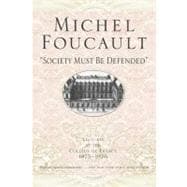
"Society Must Be Defended" Lectures at the Collège de France, 1975-1976
by Foucault, Michel; Macey, David-

Receive Free Shipping To The More Store!*
*Marketplace items do not qualify for the free shipping promotion.
Buy New
Rent Book
Used Book
We're Sorry
Sold Out
eBook
We're Sorry
Not Available
How Marketplace Works:
- This item is offered by an independent seller and not shipped from our warehouse
- Item details like edition and cover design may differ from our description; see seller's comments before ordering.
- Sellers much confirm and ship within two business days; otherwise, the order will be cancelled and refunded.
- Marketplace purchases cannot be returned to eCampus.com. Contact the seller directly for inquiries; if no response within two days, contact customer service.
- Additional shipping costs apply to Marketplace purchases. Review shipping costs at checkout.
Summary
Author Biography
David Macey has translated twenty books from the French and is the author of The Lives of Michel Foucault and Frantz Fanon (Picador). He lives in Leeds, England.
Table of Contents
Introduction: Arnold I. Davidson
One: 7 January 1976
What is a lecture? — Subjugated knowledges. — Historical knowledge of struggles, genealogies, and scientific discourse. — Power, or what is at stake in genealogies. — Juridical and economic conceptions of power. — Power as repression and power as war. — Clausewitz's aphorism inverted.
Two: 14 January 1976
War and power. — Philosophy and the limits of power. — Law and royal power. — Law, domination, and subjugation. — Analytics of power: questions of method. — Theory of sovereignty. — Disciplinary power. — Rule and norm.
Three: 21 January 1976
Theory of sovereignty and operators of domination. — War as analyzer of power relations. — The binary structure of society. — Historico-political discourse, the discourse of perpetual war. — The dialectic and its codifications. — The discourse of race struggle and its transcriptions.
Four: 28 January 1976
Historical discourse and its supporters. — The counterhistory of race struggle. — Roman history and biblical history. — Revolutionary discourse. — Birth and transformation of racism. — Race purity and State racism: the Nazi transformation and the Soviet transformation.
Five: 4 February 1976
Answer to a question on anti-Semitism. — Hobbes on war and sovereignty. — The discourse on the Conquest in England: royalists, parliamentarians, and Levellers. — The binary schema and political historicism. — What Hobbes wanted to eliminate.
Six: 11 February 1976
Stories about origins. — The Trojan myth. — France's heredity. — "Franco-Gallia." — Invasion, history, and public right. — National dualism. — The knowledge of the prince. — Boulainvillier's "Etat de la France." — The clerk, the intendant, and the knowledge of the aristocracy. — A new subject of history. — History and constitution.
Seven: 18 February 1976
Nation and nations. — The Roman conquest. — Grandeur and decadence of the Romans. — Boulainvilliers on the freedom of the Germans. — The Soissons vase. — Origins of feudalism. — Church, right, and the language of State. — Boulainvilliers: three generalizations about war: law of history and law of nature, the institutions of war, the calculation of forces. — Remarks on war.
Eight: 25 February 1976:
Boulainvilliers and the constitution of a historico-political continuum. — Historicism. — Tragedy and public right. — The central administration of history. — The problematic of the Enlightenment and the genealogy of knowledges. — The four operations of disciplinary knowledge and their effects. — Philosophy and science. — Disciplining knowledges.
Nine: 3 March 1976
Tactical generalization of historical knowledge. — Constitution, Revolution, and cyclical history. — The savage and the barbarian. — Three ways of filtering barbarism: tactics of historical discourse. — Questions of method: the epistemological field and the antihistoricism of the bourgeoisie. — Reactivation of historical discourse during the Revolution. — Feudalism and the gothic novel.
Ten: 10 March 1976
The political reworking of the idea of the nation during the Revolution: Sieyès. — Theoretical implications and effects on historical discourse. — The new history's grids of intelligibility: domination and totalization. — Montlosier and Augustin Thierry. — Birth of the dialectic.
Eleven: 17 March 1976
From the power of sovereignty to power over life. — Make live and let die. — From man as body to man as species: the birth of biopower. — Biopower's fields of application. — Population. — Of death, and of the death of Franco in particular. — Articulations of discipline and regulation: workers' housing, sexuality, and the norm. — Biopower and racism. — Racism: functions and domains. — Nazism. — Socialism.
Course Summary
Situating the Lectures: Alessandro Fontana and Mauro Bertani
Index
An electronic version of this book is available through VitalSource.
This book is viewable on PC, Mac, iPhone, iPad, iPod Touch, and most smartphones.
By purchasing, you will be able to view this book online, as well as download it, for the chosen number of days.
Digital License
You are licensing a digital product for a set duration. Durations are set forth in the product description, with "Lifetime" typically meaning five (5) years of online access and permanent download to a supported device. All licenses are non-transferable.
More details can be found here.
A downloadable version of this book is available through the eCampus Reader or compatible Adobe readers.
Applications are available on iOS, Android, PC, Mac, and Windows Mobile platforms.
Please view the compatibility matrix prior to purchase.
